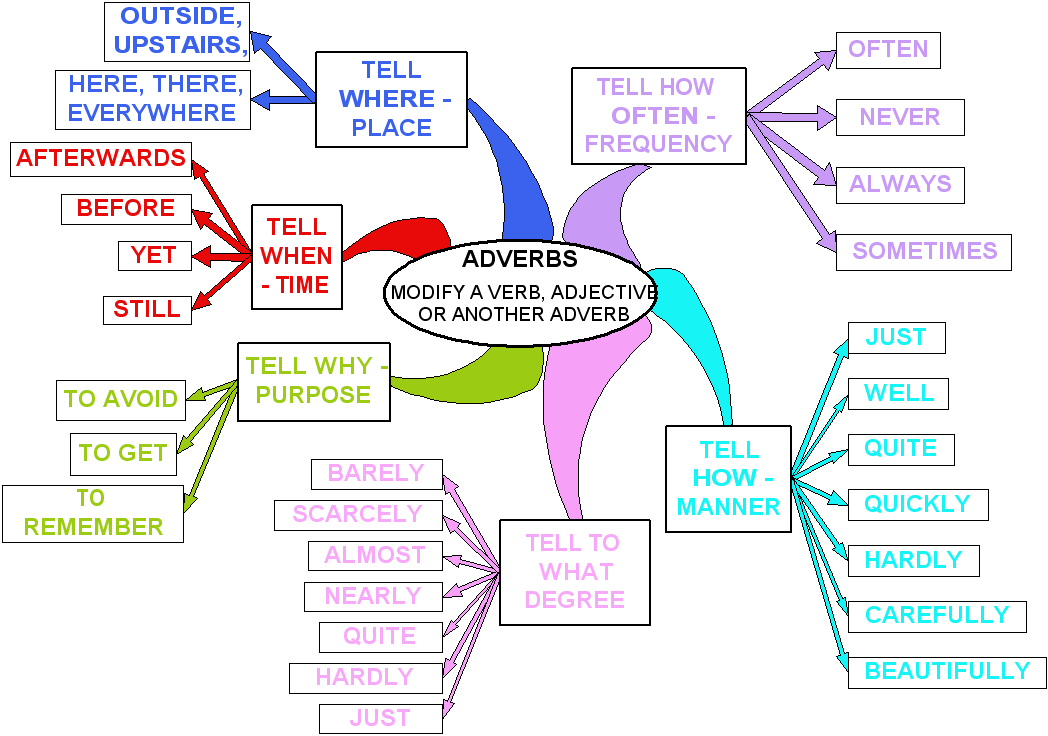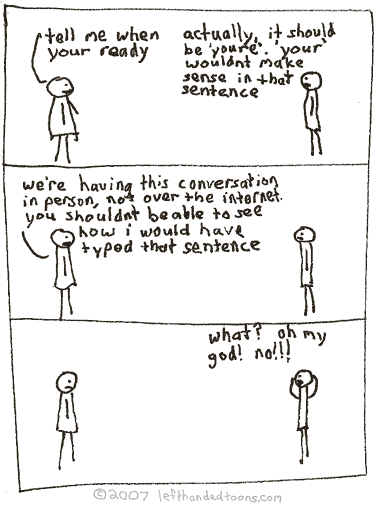A Storyline
Marty McFly, a typical American teenager of the Eighties, is accidentally sent back to 1955 in a plutonium-powered DeLorean "time machine" invented by slightly mad scientist. During his often hysterical, always amazing trip back in time, Marty must make certain his teenage parents-to-be meet and fall in love - so he can get back to the future.
CONDITIONAL
A: What time will you be back?USO DE IF E WHEN
B: About 12. I’ll phone when if I’m late.
A: OK. Say hello to James for me if you see him.
B: OK. I’ll give him a kiss from you if he will be is there. OK?
A: Well, I’d rather give him a kiss myself.
B: I tell I’ll tell him that if I see him.
- if e whenpodem ser usados um no lugar do outro quando significam “sempre que” / “toda vez que”
- When/if you heat ice, it turns to water. [Quando / Se você esquenta gelo, ele vira água.]
- “se” significando “caso” é traduzido por if:
- If (When) it rains today, I’ll stay home. [Se chover hoje, ficarei em casa.]
Compare:
-
- If I see Jim, I’ll show him this letter. [Se eu vir/Caso eu veja o Jim, lhe mostrarei a carta.]
- When I see Jim, I’ll show him this letter. [Quando eu vir o Jim, lhe mostrarei a carta.]
- Orações condicionais indicam que algo está na dependência de certas
circunstâncias. Estas frases apresentam duas partes: (a) oração com if(menciona a condição) e (b) a oração principal (menciona a conseqüência).
- (a) If I have time after work, (b) I’ll go shopping this evening. [Se eu tiver tempo após o trabalho, farei compras à noite.]
- A oração com ifpode seguir a oração principal. Nesse caso, não pode haver vírgula entre as duas orações.
- Tom will phone if he needs our help. [O Tom vai ligar se ele precisar de nossa ajuda.]
- A seqüência temporal é fixa nas condicionais: oração com if(presente) e oração principal (will).
- If Ann finds anything out, she’ll tell (she tells) us tomorrow. [Se a Ann descobrir alguma coisa, nos informará amanhã.]
- If the weather is bad, we’ll probably come home early. [Se o tempo estiver ruim, chegaremos provavelmente mais cedo em casa.]
- Na oração com if, não há will: If I am (will be), I’ll phone.
- Na oração principal, podem também ocorrer o imperativo ou um modal verb (can, might, mustetc.).
- If you hear the postman, tell me. [Se você escutar o carteiro, diga-me.]
- If it stops raining, we can play tennis. [Se parar de chover, poderemos jogar tênis.]
- Na oração com if, pode também ocorrer um modal verb: If you can’t come, please phone.
- As duas orações (a oração com if e a oração principal) estão no presente quando if significa “sempre que” / “toda vez que” (compare com o exemplo acima: If you heat ice, it turns to water).
Referência: “Grammar – No problem” – Christine House e John Stevens, Disal Editora, 2005.RESUMO
- “quando” com significado temporal = when; “se” com significado de “caso” = if
- Oração com if: presente; oração principal: will
- Não se usa will na oração com if!
Source: tecla Sap.
Exercise 2
Exercise / if-clauses
Conditional sentences
_____________________________________________________
UNIT 10
Perhaps we could learn a few mores advanced uses of Conditional sentences
As for the traditional types you could refresh your knowledge by clicking here
And for the more sophisticated types
1.-If with would and should for polite purposes
If you wouldn´t mind waiting for a moment, the doctor will see you shortly
Should you want to contact me, I will be in the office from 9 till 5
(More common in written English)
2.-There are also rhetorical conditional sentences which need to be
interpreted as they mean the opposite of their literal meanings
If you believe that, you´ll believe anything (you can´t believe that)
She is nothing if not tough ( She is really tough)
If they are Irish, I am the Pope (they are certainly not Irish)
3.-If formulas for expresing politeness, ideal in oral exams
If you don´t mind me saying so,……source: http://yourenglishlessons.wordpress.com/2010/05/16/what-if/
If I may interrupt …
If I may change the subject…
If you can keep a secret…
If you see what I mean…
If I understand you correctly…
Exercise / if-clauses
Conditional sentences
I’d build a treefort in our yard
If I had a 1,000,000 (a million dollars)
_____________________________________________________
UNIT 10
Listening (would, could, should)
Short answers (So/Neither)
Extra
Prepositions FOR and SINCE
___________________________________________________________
UNIT 11
___________________________________________________________________nit UNIT 12
Listening: Contrastive stress in responses
Prepositions FOR and SINCE
________________________________________________________________________
UNIT 13
MOVIE MANIA
PARTICLES AS ADJECTIVES
EXPLANATION AND PRACTICE
LEARN MORE
RELATIVE CLAUSES
LISTENING - SYLLABLE STRESS
______________________________________________________________________
UNIT 14
__________________________________________________
BODY LANGUAGE
______________________________________________________________________
MODALS AND ADVERBS
PERMISSION, OBLIGATION,PROHIBITION
A piece of advice from the Avengers
ALL ABOUT MODALS AND ADVERBS
_____________________________________________________
UNIT 15
Unreal conditional sentences with if clauses 1
Unreal conditional sentences with if clauses 2
Listening: past modals
______________________________________
UNIT 16
Expressions
Charlie said: “Go home, Snoopy”.
Charlie told Snoopy to go home.
Charlie said to Snoopy to go home
Reported Seech
In Portuguese
Complementary information
Exercise: reported commands
reported commands: negative sentences
Reported speech: Simple statements
Reportedspeech: Statements with adverbs of time
Sum up
Complementary Study
Exercises: "say" and "tell"
Say, tell or ask?
______________________________________
UNIT 16
Expressions
Charlie said: “Go home, Snoopy”.
Charlie told Snoopy to go home.
Charlie said to Snoopy to go home
Reported Seech
In Portuguese
Complementary information
Orders, requests and advice are reported by using an infinitive.
The teacher said: “Be quiet”
changes to
The teacher told the students to be quiet.
Exercise: reported commands
reported commands: negative sentences
Reported speech: Simple statements
Reportedspeech: Statements with adverbs of time
Sum up
Complementary Study
| SAY | TELL |
| yes | the truth |
| no | a lie |
| something | a joke |
| a prayer | the time |
| a word | a story |
| hello | a secret |
| goodbye | the difference |
Say, tell or ask?


















